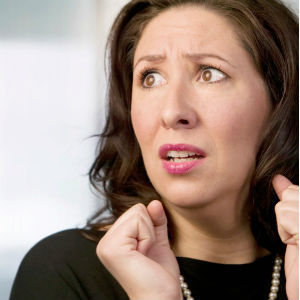 Do you live in fear and anxiety? Do you think they protect you? They may—to a degree.
Do you live in fear and anxiety? Do you think they protect you? They may—to a degree.
The startle reflex is protective; if we happen to step in front of a moving car, we immediately jump back, and that is a good thing. This reflex originates in the brain stem.
The fight, flight, or freeze response originates in the amygdala in the mid-brain. It is triggered when we sense danger. When we do not feel safe, we react instinctively without being aware of what we just perceived. The amygdala can be compared to a scanner on a submarine that is always on alert for danger. We are mostly unaware that this is happening. If we perceive a threat to our survival or emotional well-being, we generally respond by fighting back, fleeing, or freezing.
The third level of fear is irrational beliefs and unreasonable expectations. These beliefs are located in our higher brain, the cortex, which is the seat of judgment and executive functioning. Many of our beliefs were formed so early in childhood that they seem like facts that are a part of who we are. Others were adopted later through cultural influences. Challenging or changing these beliefs may bring up more fears and resistance. We are familiar with the way we think and experience and do not know what our world would be like if we changed our beliefs. We can ask ourselves, “Would I rather be right about my way of thinking and collect evidence to prove and validate my beliefs? Or am I willing to challenge my beliefs in a way that would allow me to be happier?”
Anxiety and stress can take a toll on our mental and physical health. At the same time, they can serve us. If we view stress as bad and try to get rid of it, it has a more negative effect. But if we understand it as serving us, the detrimental effects are negated. The degree of fear, stress, or anxiety, and the effect on us, has to do with our beliefs about it. If you’re about to step on stage in front of a few thousand people, do you experience exhilaration, terror, or panic? How you define the event and what you say to yourself about it will determine your stress or relaxation level. Being a little scared but having a lot more excitement may be the best combination for peak performance.
Worry is frequently based on irrational or unreasonable expectations about the future. You may worry about not having enough money. Or you may worry about not being liked, saying or doing the wrong thing, or doubting that you are worthy and valuable. Specific fears or phobias—for example, snakes, bugs, and storms—may also worry you. All of these can haunt you until you find a way to release them. Notice how much you say to yourself, “What if (fill in the blank)?”
Ask yourself, “Do my beliefs protect me or just cause me to feel miserable? Are they beliefs I have chosen or ones I have taken on because that is what others have told me?” Since you decide what to believe, you also decide what not to believe. It is your choice.
Make a list of the things you think you are afraid of or worry about and challenge them. Ask if these are beliefs you chose or ones you just grew up believing because your parents, teachers, church, peers, or media told you it’s what you should think.
Be honest with yourself. It is the only way you are going to get to having more rational, reasonable expectations that bring you more peace and happiness.

The preceding article was solely written by the author named above. Any views and opinions expressed are not necessarily shared by GoodTherapy.org. Questions or concerns about the preceding article can be directed to the author or posted as a comment below.

 Grow Through Your FOMO (Fear of Missing Out)
Grow Through Your FOMO (Fear of Missing Out) The Power of Touch in the Face of Fear
The Power of Touch in the Face of Fear Want to Soar? Let Go of Outcome, Failure, and Imperfection
Want to Soar? Let Go of Outcome, Failure, and Imperfection

